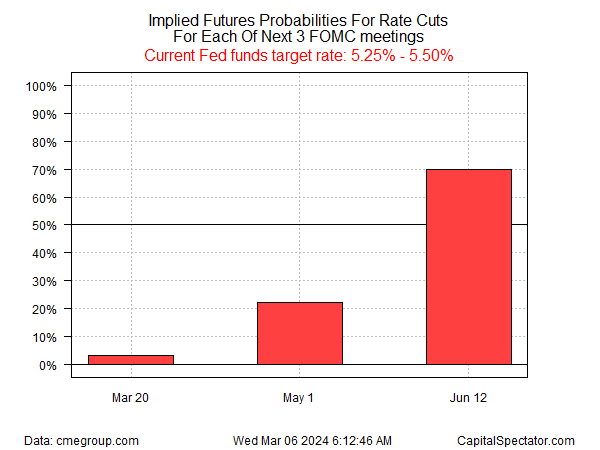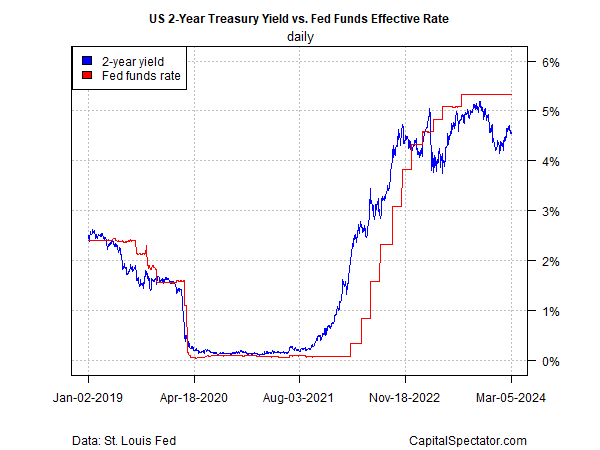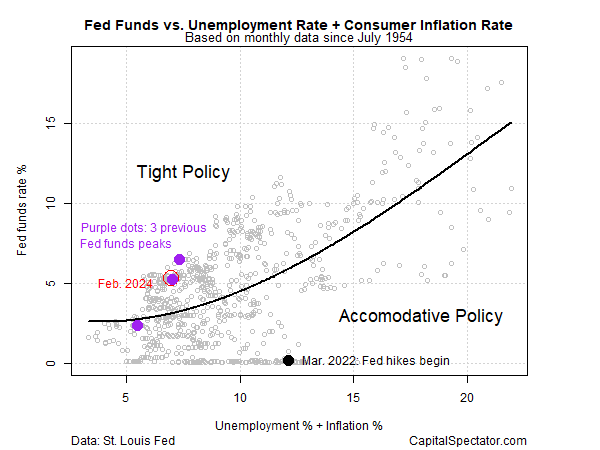Fed Chair Jerome Powell is scheduled to testify in the House today (Wed., Mar. 6) and markets will be all ears on topics that offer guidance on the outlook for interest-rate cuts.
The current consensus anticipates that the central bank will begin easing policy at the June 12 FOMC meeting.
The Fed funds futures market this morning is pricing in a roughly 70% probability that Powell and company will trim the current 5.25%-to-5.50% target rate three months hence.

Although the crowd is still looking for a rate cut in June, confidence has faded a bit in recent weeks.
One reason is that the latest inflation data has been hotter than expected. Another factor: US economic activity remains solid. The combination leaves room for doubt that the Fed will feel compelled to start cutting in June.
“The US economy remains very robust and the main engine of global growth,” says Gregory Daco, chief economist at EY.
“There are headwinds, but overall there are no indications of an imminent retrenchment in the private sector,” he tells the Financial Times.
Meanwhile, Fed officials have been trying to soften expectations that a policy change is imminent. Tom Barkin, CEO of the Richmond Fed and a member of the central bank’s policy committee that oversees rates, expressed caution on Friday about the prospects that cuts are near.
“We’ll see,” he told CNBC. “I’m still hopeful inflation is going to come down and if inflation normalizes, then it makes the case for why you’d want to start normalizing rates.”
The Treasury market, however, remains relatively confident that a rate cut is brewing, based on the policy-sensitive 2-year yield, which remains well below the Fed funds target rate. The caveat, of course, is that the Treasury market’s implied forecast for a lower target rate is more than a year old so it’s not obvious that this outlook is timely.

What is clear is that policy is tight, based on a model using unemployment and consumer inflation. This simple formulation suggests that the Fed has room to reduce its target rate to move closer to state of equilibrium.
The question du jour is how or if the calculus changes in today’s testimony from Powell?
“Is it possible that Fed Chair Powell could speak about policy in a way that further sours the mood of an already wobbly [stock] market? I mean, I can see the possibility here. We also then have the unknown about Friday with the Feb jobs report,” says Tom Lee, head of research at Fundstrat.
Although Powell will face many questions today, markets are primarily interested in on, notes Quincy Krosby, chief global strategist at LPL Financial.
“The question now for the market is to glean any information on when the Fed will begin employing rate cuts and how many,” she says.
“He’s not going to answer that necessarily. But if there is any change, any nuance, that is what the market wants to see.”
